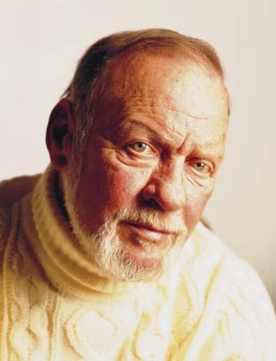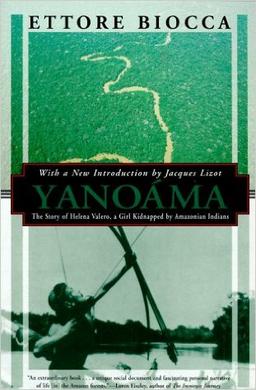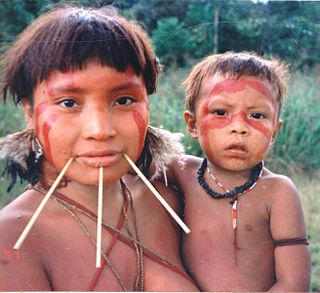Richard Brian Ferguson (born 1951) is an American anthropologist. [1] He is an authority on warfare. [2]
Richard Brian Ferguson (born 1951) is an American anthropologist. [1] He is an authority on warfare. [2]
Richard Brian Ferguson was born in New York, New York on July 19, 1951. He spent his childhood in upstate New York.[ citation needed ]
Ferguson attended Columbia University, graduating with a bachelor's degree in anthropology in 1974. During this time he was involved in activism opposing the Vietnam war. He earned his doctorate in anthropology from Columbia University in 1988, with dissertation field work in Puerto Rico. [3]
Ferguson is now a tenured professor of Anthropology at Rutgers University Newark. His expertise lies in cultural anthropology, the anthropology of war, ethnic conflict, state-tribe interaction, policing, and Puerto Rico. He is part of the Department of Sociology and Anthropology as well as Global Urban Studies/Urban Systems. He has also served on the board of governors of the New York Academy of Sciences. [3] Ferguson has published many papers critical of biological perspectives in anthropology, especially explanations of war. [4]

Napoleon Alphonseau Chagnon was an American cultural anthropologist, professor of sociocultural anthropology at the University of Missouri in Columbia and member of the National Academy of Sciences. Chagnon was known for his long-term ethnographic field work among the Yanomamö, a society of indigenous tribal Amazonians, in which he used an evolutionary approach to understand social behavior in terms of genetic relatedness. His work centered on the analysis of violence among tribal peoples, and, using socio-biological analyses, he advanced the argument that violence among the Yanomami is fueled by an evolutionary process in which successful warriors have more offspring. His 1967 ethnography Yanomamö: The Fierce People became a bestseller and is frequently assigned in introductory anthropology courses.
Eric Robert Wolf was an anthropologist, best known for his studies of peasants, Latin America, and his advocacy of Marxist perspectives within anthropology.

Julian Haynes Steward was an American anthropologist known best for his role in developing "the concept and method" of cultural ecology, as well as a scientific theory of culture change.

Rexford Guy Tugwell was an American economist who became part of Franklin D. Roosevelt's first "Brain Trust", a group of Columbia University academics who helped develop policy recommendations leading up to Roosevelt's New Deal. Tugwell served in FDR's administration until he was forced out in 1936. He was a specialist on planning and believed the government should have large-scale plans to move the economy out of the Great Depression because private businesses were too frozen in place to do the job. He helped design the New Deal farm program and the Resettlement Administration that moved subsistence farmers into small rented farms under close supervision. His ideas on suburban planning resulted in the construction of Greenbelt, Maryland, with low-cost rents for relief families. He was denounced by conservatives for advocating state-directed economic planning to overcome the Great Depression.

Timothy Asch was an American anthropologist, photographer, and ethnographic filmmaker. Along with John Marshall and Robert Gardner, Asch played an important role in the development of visual anthropology. He is particularly known for his film The Ax Fight and his role with the USC Center for Visual Anthropology.
Sidney Wilfred Mintz was an American anthropologist best known for his studies of the Caribbean, creolization, and the anthropology of food. Mintz received his PhD at Columbia University in 1951 and conducted his primary fieldwork among sugar-cane workers in Puerto Rico. Later expanding his ethnographic research to Haiti and Jamaica, he produced historical and ethnographic studies of slavery and global capitalism, cultural hybridity, Caribbean peasants, and the political economy of food commodities. He taught for two decades at Yale University before helping to found the Anthropology Department at Johns Hopkins University, where he remained for the duration of his career. Mintz's history of sugar, Sweetness and Power, is considered one of the most influential publications in cultural anthropology and food studies.

Ritual warfare is a state of continual or frequent warfare, such as is found in some tribal societies.
This is a two-part chronological list of the works of anthropologist Marvin Harris. The first list contains his scholarly articles; the second contains his books.
Andrew P. "Pete" Vayda was a Hungarian-born American anthropologist and ecologist who was a distinguished professor emeritus of anthropology and ecology at Rutgers University.

Yanoama: The Story of Helena Valero, a Girl Kidnapped by Amazonian Indians is a biography of Helena Valero, a mixed-race mestizo woman who was captured in the 1930s as a girl by the Kohorochiwetari, a tribe of the Yanomami indigenous people, living in the Amazon rainforest on the border between Venezuela and Brazil. She lived with the Yanomami for about two decades. While living with the Yanoama, Valero married twice and gave birth to four children. She escaped in 1956 to what she refers to as "the white man" in the country of her birth. After rejection by her family and living in poverty at a mission, Valero chose to return to life with the Yanomami.
The Haximu massacre, also known as the Yanomami massacre, was an armed conflict in Brazil in 1993. The conflict occurred just outside Haximu, Brazil, near the Venezuelan border, beginning in mid-June or July of 1993. Sixteen Yanomami people were killed by a group of garimpeiros, or gold miners who mine the land illegally.
Raptio is a Latin term for the large-scale abduction of women: kidnapping for marriage, concubinage or sexual slavery. The equivalent German term is Frauenraub.

The Yanomami, also spelled Yąnomamö or Yanomama, are a group of approximately 35,000 indigenous people who live in some 200–250 villages in the Amazon rainforest on the border between Venezuela and Brazil.
Arlene Dávila is an American professor of Latino/a Studies. She has contributed to the field of Latino/a Studies as both an author and professor. She is the founding director of The Latinx Project, and has written eight books and many articles on issues ranging from depictions of public images of Latinos, marketing to Latinos, cultural politics in Puerto Rico, and Latinization of the United States. Her research focuses on race and ethnicity, media studies, and Puerto Rican national identities. She is a professor at New York University.
Political economy in anthropology is the application of the theories and methods of historical materialism to the traditional concerns of anthropology, including but not limited to non-capitalist societies. Political economy introduced questions of history and colonialism to ahistorical anthropological theories of social structure and culture. Most anthropologists moved away from modes of production analysis typical of structural Marxism, and focused instead on the complex historical relations of class, culture and hegemony in regions undergoing complex colonial and capitalist transitions in the emerging world system.

Alisse Waterston is an American professor of anthropology at John Jay College of Criminal Justice, City University of New York. Her work focuses on how systemic violence and inequality influence society.
Helen M. Icken Safa was an anthropologist, feminist scholar and academic. Safa focused her work on Latin American studies and she served as president of the Latin American Studies Association from 1983 to 1985. She taught anthropology and Latin American studies at Syracuse University, Rutgers University and the University of Florida. She received the Silvert Award, the highest honor given by the Latin American Studies Association.

Iris López is a contemporary professor, anthropologist, sociologist, and author, whose work focuses on feminist, Latino, and Latin American studies. She has one full-length book published, an ethnography about sterilization within female Puerto Rican populations, titled Matters of Choice. She received both her Masters and Doctoral degrees in Anthropology from Columbia University. Currently, López teaches sociology at the City College of New York, part of the City University of New York (CUNY), where she has been the Director of the Latin American and Latino Studies Program since 2016.

Yarimar Bonilla is a Puerto Rican political anthropologist, author, columnist, and professor of anthropology and Puerto Rican studies at Hunter College and the Graduate Center of the City University of New York. Bonilla’s research questions the nature of sovereignty and relationships of citizenship and race across the Americas.
Elena Padilla is a Puerto Rican anthropologist. She has conducted pioneering research on Puerto Rican migrations to the United States. Padilla attended the University of Puerto Rico, and after graduation was sent on scholarship to study at the University of Chicago. She wrote a master's thesis on Puerto Ricans in New York and Chicago that was published in 1947, and has been cited as a pioneering work.